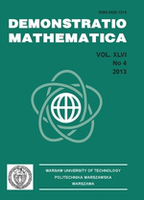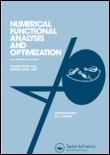
POSITIVITY
metrics 2024
Catalyzing Intellectual Growth in Mathematics and Analysis
Introduction
POSITIVITY is a distinguished journal published by Springer, focusing on cutting-edge research in the realms of Mathematics, Analysis, and Theoretical Computer Science. Since its inception in 1997, the journal has fostered intellectual rigor and innovation, catering to a diverse audience of researchers, professionals, and students alike. With an esteemed Q2 ranking in 2023 across multiple categories including General Mathematics, Analysis, and Theoretical Computer Science, POSITIVITY serves as a significant platform for disseminating high-impact findings that advance knowledge in these fields. Though it does not operate under an Open Access model, the journal provides critical insights that contribute to its commendable standing, reflected in its Scopus rankings, which highlight the journal's influence within the academic community. The ongoing publication until 2024 ensures that POSITIVITY remains at the forefront of mathematical discourse, making it an invaluable resource for those dedicated to pushing the boundaries of theoretical and applied mathematics.
Metrics 2024
 0.60
0.60 0.80
0.80 0.90
0.90 35
35Metrics History
Rank 2024
Scopus
IF (Web Of Science)
JCI (Web Of Science)
Quartile History
Similar Journals

Analysis Mathematica
Unveiling the complexities of analysis for a brighter mathematical future.Analysis Mathematica is a distinguished academic journal dedicated to the field of mathematics, focusing specifically on the varied aspects of analysis. Published by Springer International Publishing AG and based in Hungary, this journal has been an essential platform for scholarly communication since its inception in 1975. With a broad scope that encompasses theoretical developments and applications in mathematical analysis, it serves as a conduit for innovative research and discourse among mathematicians and researchers alike. While it currently holds a Q3 ranking in both Analysis and Miscellaneous Mathematics categories as of 2023, contributing authors are encouraged to elevate its impact through substantial contributions. Although not currently an open-access journal, Analysis Mathematica remains accessible through various academic databases, making it an invaluable resource for professionals, students, and researchers striving for excellence in mathematical analysis.

Annales Fennici Mathematici
Fostering Insightful Discoveries in MathematicsAnnales Fennici Mathematici is a prestigious academic journal published by Suomalainen Tiedeakatemia based in Helsinki, Finland. With an ISSN of 2737-0690 and an E-ISSN of 2737-114X, this journal has quickly established itself as an essential resource in the field of mathematics since its inception in 2021. It boasts an impressive Q1 categorization in Mathematics (miscellaneous) for 2023, highlighting its impact among top-tier mathematical publications. Currently, it holds a Scopus rank of #135 out of 399 in General Mathematics, placing it in the 66th percentile among its peers, ensuring visibility and relevance for its published works. The journal is committed to providing a platform for innovative research and the dissemination of mathematical discoveries, making it an invaluable resource for researchers, professionals, and students looking to expand their knowledge and engage with contemporary mathematical challenges.

Commentationes Mathematicae Universitatis Carolinae
Nurturing Emerging Research in MathematicsCommentationes Mathematicae Universitatis Carolinae, with ISSN 0010-2628 and E-ISSN 1213-7243, is a distinguished academic journal published by the Faculty of Mathematics and Physics at Charles University in the Czech Republic. Established in 1996, this journal serves as a platform for original research articles and contributions in the field of mathematics, catering to a diverse range of topics within the discipline. While classified in the Q4 quartile for 2023, it occupies an important niche within the mathematical community, particularly for emerging research and comprehensive studies. Although it is not open access, it offers authors an opportunity to disseminate their work through a reputable publisher, renowned for its scholarly contributions. With a focus on fostering academic discourse, Commentationes Mathematicae aims to engage researchers, professionals, and students alike, enriching the mathematical landscape and promoting collaboration within the field.

PUBLICATIONES MATHEMATICAE DEBRECEN
Cultivating a Global Community of Mathematical ScholarsPublicationes Mathematicae Debrecen is a renowned international journal published by the University of Debrecen, Institute of Mathematics, situated in Hungary. This journal, with both ISSN 0033-3883 and E-ISSN 2064-2849, has established itself in the field of mathematics since its inception, with coverage extending from 1997 to 2024. Recognized for its rigorous academic standards, it currently holds a Q3 ranking in the mathematics (miscellaneous) category for 2023 and ranks at the 42nd percentile among general mathematics journals in Scopus. Publicationes Mathematicae Debrecen aims to disseminate high-quality research across various areas of mathematics, contributing to the advancement of knowledge and practice in this dynamic field. Although it is not an open-access journal, its readers can access a wealth of scholarly work that addresses both theoretical and applied mathematical issues, making it an invaluable resource for researchers, professionals, and students alike.

Demonstratio Mathematica
Illuminating the Path of Mathematical DiscoveryDemonstratio Mathematica, published by DE GRUYTER POLAND SP Z O O, is an esteemed open-access journal in the field of mathematics, with an ISSN of 0420-1213 and E-ISSN 2391-4661. Established in 1996 and providing open access since 2009, it has become a vital platform for disseminating innovative research and advancements in various areas of mathematics. With a commendable Scopus ranking of 85/399 in General Mathematics and a 2023 Category Quartile of Q2, it stands at the forefront of the mathematical community, demonstrating a significant impact within the top 78th percentile. The journal aims to foster a deeper understanding and appreciation of mathematical concepts and their applications, catering to both seasoned researchers and emerging scholars. Located in Warsaw, Poland, Demonstratio Mathematica not only enriches the academic discourse but also strengthens collaborative efforts within the international mathematics community, making it an essential resource for those seeking to expand their knowledge and research output.

Izvestiya Instituta Matematiki i Informatiki-Udmurtskogo Gosudarstvennogo Universiteta
Illuminating the Path of Computational AdvancementsIzvestiya Instituta Matematiki i Informatiki-Udmurtskogo Gosudarstvennogo Universiteta is a distinguished academic journal published by Udmurt State University, located in the Russian Federation. Focusing on the fields of mathematics and computer science, particularly in Computational Theory and Mathematics, the journal is a vital platform for researchers and professionals to disseminate innovative findings and theoretical advancements. With an ISSN of 2226-3594 and an E-ISSN of 2410-1737, it holds a Q3 categorization in both Computational Theory and Mathematics and Mathematics (miscellaneous) for the year 2023, signifying its role in contributing to scholarly discourse. The journal has been operational since 2019, with a commitment to enhance understanding in its domain through the publication of original research articles, reviews, and technical notes. Although not currently open access, its content is crucial for those engaged in mathematical and computational sciences, providing insights that can impact both theoretical and practical applications. Researchers, professionals, and students alike will find valuable resources within its pages as they navigate the complexities of contemporary mathematical challenges and computational methodologies.

NUMERICAL FUNCTIONAL ANALYSIS AND OPTIMIZATION
Transforming insights into impactful solutions for real-world challenges.NUMERICAL FUNCTIONAL ANALYSIS AND OPTIMIZATION, published by Taylor & Francis Inc, is a premier international journal dedicated to advancing the fields of analysis, optimization, and applied mathematics. With its ISSN 0163-0563 and E-ISSN 1532-2467, this journal has established itself as a vital resource for researchers and practitioners seeking to explore innovative methodologies and applications. Covering a broad spectrum of topics intersecting mathematical analysis and computer science, it has consistently ranked in the Q2 tier for Analysis and Control and Optimization categories and is well-regarded in the communities of Signal Processing and Computer Science Applications. The journal's commitment to publishing high-quality research ensures significant contributions to solving complex problems in various fields, making it an essential reference for students, academics, and industry professionals. With a publishing history dating back to 1979, it encourages the dissemination of groundbreaking ideas and practical methodologies, fostering a collaborative academic environment. Access to the published articles may vary, so contributors and readers are encouraged to engage with the latest findings and ongoing research through the journal’s platform.

Banach Journal of Mathematical Analysis
Advancing Knowledge in Mathematical AnalysisWelcome to the Banach Journal of Mathematical Analysis, a distinguished publication under the auspices of SPRINGER BASEL AG, dedicated to the field of mathematical analysis and its applications. With a strong reputation reflected in its Q2 ranking within both Algebra and Number Theory as well as Analysis categories for 2023, this journal serves as a pivotal resource for researchers and professionals striving to advance their understanding and contributions to the mathematical sciences. As an esteemed platform featuring innovative research from around the globe, the journal promotes open discourse among practitioners of various mathematical disciplines. Although currently not an open access journal, it enhances visibility through rich content, consistently ranked with notable Scopus metrics, including impressive standings in both algebraic structures and analytic methods. Join a vibrant community of scholars who are shaping the future of mathematics by exploring the latest insights and methodologies published within these pages.

CZECHOSLOVAK MATHEMATICAL JOURNAL
Elevating Understanding through Rigorous InquiryCzechoslovak Mathematical Journal is a distinguished academic journal published by Springer Heidelberg, dedicated to advancing the field of mathematics through the dissemination of high-quality research. With an ISSN of 0011-4642 and E-ISSN 1572-9141, this journal has been a pivotal platform for mathematicians and researchers from around the globe since its inception. The journal holds a Q3 ranking in the field of Mathematics (miscellaneous), demonstrating its commitment to providing a forum for the latest mathematical theories and applications, particularly in general mathematics, as indicated by its Scopus rank of #285/399 and 28th percentile in the field. While currently not offering open access options, the journal continues to attract a wide readership by making its valuable content available through traditional subscription models. The Czechoslovak Mathematical Journal serves as an essential resource for researchers, professionals, and students aiming to stay informed about recent developments and breakthroughs in mathematics, with focus years converging from 1995 to 2024.

Journal of Mathematical Analysis
Fostering Global Collaboration in Mathematical ResearchThe Journal of Mathematical Analysis, published by UNIV PRISHTINES in Serbia, offers a dedicated platform for the dissemination of innovative research in the fields of mathematical analysis and applied mathematics. With an ISSN of 2217-3412 and a convergence period from 2020 to 2024, this journal aims to foster significant advancements in both theoretical and practical aspects of mathematics. Categorized in the Q4 quartile for Analysis, Applied Mathematics, and miscellaneous Mathematics as of 2023, it serves as an essential resource for researchers and professionals alike, providing key insights into the evolving landscape of mathematical inquiry. Although it is an open access journal, facilitating global readership, its Scopus rankings reflect its emerging status, with rankings indicating a 51st percentile in Mathematics (miscellaneous) and 28th percentile in Applied Mathematics. This journal not only aims to contribute to academic discourse but also seeks to bridge gaps between mathematical theory and real-world applications, making it a vital resource for students and professionals engaged in the complexities of mathematical research.